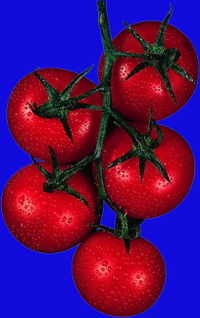Tomatoes and Prostate Cancer: What to Do? What to Do?

In June a new study on tomato intake and prostate cancer was published in the journal Cancer Epidemiology Biomarkers and Prevention and it really put the cat among the pigeons.
I am sure that you have heard a bit about the studies that seemed to show a protective effect of tomatoes on prostate cancer, and those studies have lead to large advertising campaigns by the manufacturers of the phytochemical lycopene, which is though to be a key component of the protective effect. Lycopene has attracted particular attention because it happens to be concentrated in some of the cells of the prostate gland.
Then along comes this study suggesting that lycopene offered no protection against prostate cancer in a group of 28,000 men.
It is just the latest in a long line of research into the effects of lycopene-containing foods, and as I said, the majority of previous studies have suggested that tomatoes and tomato-based products offer some measure of protection against prostate cancer.
One of the key points that is so often not discussed, is that loading up on any one food or food supplement is not a good idea and certainly not supported by the research. For foods to be effective in humans, they may well have to be in their natural form, and the strongest evidence shows that diets high in a variety of different fruits, vegetables, whole grains and beans are associated with lower risk of developing heart disease, cancer and several other problems.
It is certainly true that in the laboratory, tomato components have stopped the proliferation of several types of cancer cells including breast, lung, and endometrium. In animal models, consumption of large amounts of compounds extracted form tomatoes has been linked to large decreases in prostate cancer risk.
The best known study recruited 47,894 men and evaluated their diets for six years. The data showed that those who ate the most tomato products – raw, cooked tomatoes, tomato sauce, pizza and tomato juice – had a 35% lower risk of early prostate cancer and a 53% lower risk of advanced prostate cancer than men who ate the least of these foods.
We are all eagerly awaiting the publication by the American Institute of Cancer Research and its international affiliate organizations on November 1st of this year, of the most comprehensive assessment of the scientific literature on diet, physical activity and cancer risk ever undertaken.
That report, Food, Nutrition, Physical Activity and the Prevention of Cancer: A Global Perspective, will synthesize data from thousands of studies and provide guidelines for the public and for the scientific/medical community. It is bound to be controversial, but hopefully it will provide answers to questions about nutrition and cancer that are based on a thorough review of the available science.
(You can find out more about the WCRF/AICR Expert Report here. I am looking forward to reading the report and I shall be taking you through the highlights as soon as I get a copy)
Let me re-iterate one of the principles of Integrated Medicine, that is so very important when considering the impact of nutrition on health:
Combinations are Key for they create a powerful synergy.






